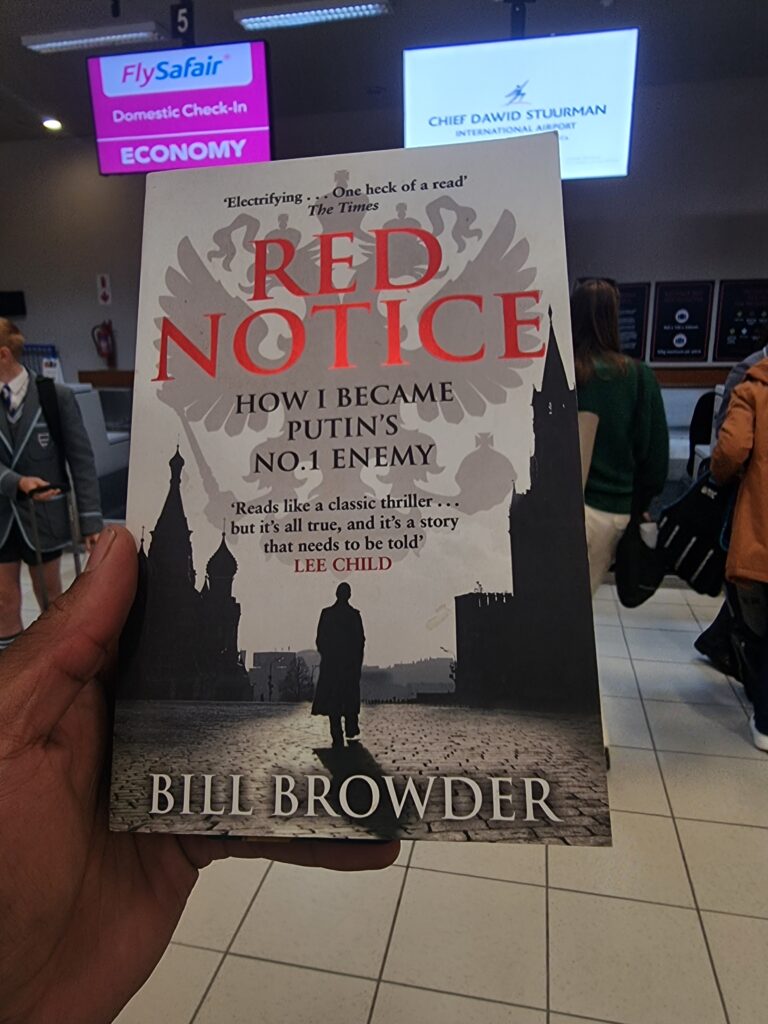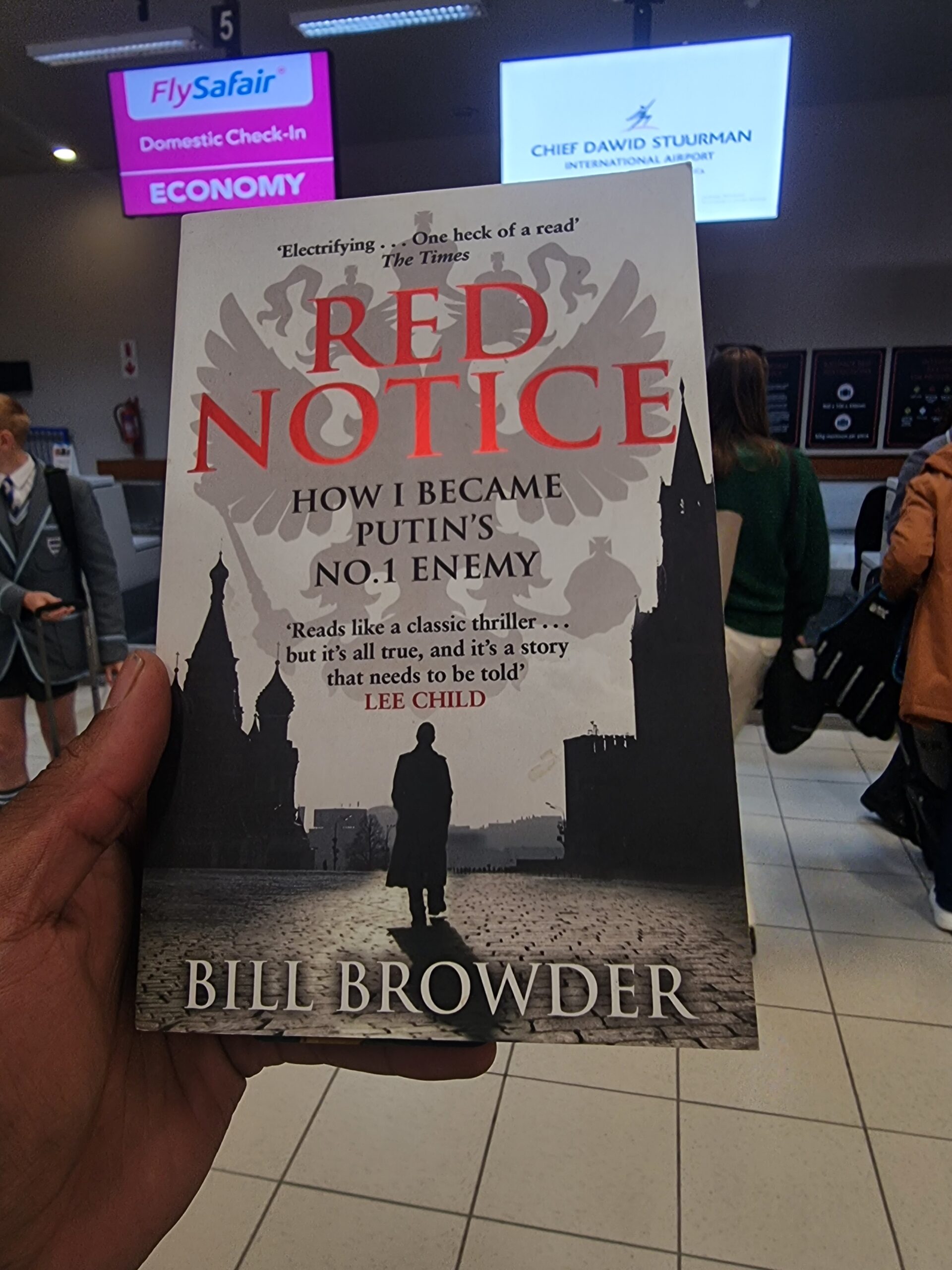
I first encountered Red Notice on a long, 16-hour drive to Hogsback in the Eastern Cape, listening to the audiobook to pass the time. What I thought would be a simple way to entertain myself turned out to be an absolutely eye-opening experience. By the time I reached my accommodation in Hogsback, I felt like I had lived through some of the most dramatic and dangerous moments in modern history. Honestly, after hearing Bill Browder’s insane story, I needed a stiff drink!
Browder’s journey into the world of finance wasn’t straightforward. In the early chapters, he talks about trying to make a name for himself, and at first, nothing worked. He wasn’t gaining traction in the finance world until he changed his strategy. Leveraging his family’s historical ties to the Communist Party in Russia (his grandfather had been the head of the American Communist Party), Browder decided to dive headfirst into the chaotic post-Soviet market. This shift in focus is where things started getting interesting—and frankly, unbelievable.
During the collapse of the Soviet Union, Russian assets were being sold off at ridiculously low prices. Most people didn’t realize the true value of what they were selling. Workers and citizens were given vouchers or “shares” in government-controlled or state-owned assets, and many were eager to offload them for quick cash, having no idea what they were worth. Browder, however, quickly figured out that this was an arbitrage opportunity like no other. He started scooping up assets at bargain prices, which, in turn, allowed him to make staggering profits. It’s fascinating to look at Browder’s strategy through the lens of Warren Buffett’s value investing principles. Browder analyzed the sale value of these assets the way Buffett might evaluate a company—recognizing intrinsic value where others saw chaos. As Buffett once said, “Price is what you pay. Value is what you get.” Browder was getting a lot of value for very little price, though the risk was astronomically high—something Buffett likely wouldn’t have touched. If you’re interested in a few more “crazy deal-making” stories here are other book reviews to equally interesting stories.
One of the craziest parts of the story is how Browder navigated the sheer lawlessness of Russia at the time. I was captivated by his descriptions of bribery and extortion that were just the norm among Russian officials and the military. There were incidents involving the sale of military hardware, like Russian helicopters and aircraft, being sold wholesale for next to nothing. Corruption was rampant, and Browder was constantly surrounded by people trying to either cheat him or coerce him into paying bribes. But somehow, he thrived in this environment.
What’s even more fascinating is how Browder came head-to-head with the Russian oligarchs. These were the real power players in the country, and when Browder found himself standing against them in key deals, it wasn’t expected that he’d fight back. In Russia, fear and avoidance of attention were the norm, and most people would simply accept their losses rather than challenge the oligarchs. But Browder, either through naivety or sheer courage, fought back. His refusal to bow down to the oligarchs caught them off guard and played to his advantage—he didn’t follow the unspoken rules of survival in post-Soviet Russia, and his fighting spirit set him apart.
But the turning point came when Browder’s interests directly collided with those of the Russian oligarchs and Vladimir Putin’s regime. Up until that point, some might have believed Browder had Putin’s tacit approval, or at least that the regime was indifferent to him. However, when the oligarchs and Putin’s regime aligned, everything changed. The threats became real, and Browder was no longer just battling corrupt business players—he was up against the full force of the Russian state. It became clear that no holds were barred, and from that moment, Browder had to flee for his life. The Russian government launched an all-out campaign against him, with his colleagues being targeted, and his very existence threatened. The tension was palpable, and I couldn’t help but feel a mix of awe and dread as I listened.
Browder’s life was now under threat, and the danger extended beyond Russian borders. This is where the term Red Notice comes into play. A Red Notice is an international alert issued by Interpol at the request of a member country to seek the arrest of a person wanted for extradition. Russia pushed for this through Interpol, turning Browder into a target across borders. The story delves into the corruption and misuse of legal systems by powerful players like Putin and the oligarchs, highlighting just how vulnerable you can be when governments decide to use international organizations like Interpol for their own purposes.
Immersing myself in this world felt unreal. The culture, the constant predation, and the hostility toward anyone perceived as a threat were shocking. It’s no wonder that Russian people refer to the term krysha, meaning “roof” or “protector,” for anyone wanting to enter the business world. You couldn’t get into business in Russia without someone powerful sponsoring and protecting you from the constant dangers. It felt like a survival game, and Browder’s retelling was so vivid, it felt almost traumatizing to hear about it. The way he described the Russian people’s resilience and spite, even to the point where they’d hurt themselves to get revenge, was chilling. His narrative painted such a realistic picture of the raw, unfiltered survival instinct that seemed to dominate life in post-Soviet Russia.
Personally, I connected with Browder’s story on a deeper level. The constant struggle, the hardships he endured, and the way he problem-solved on the fly reminded me of the challenges I’ve faced in my own life. I love stories like these because they put my own problems into perspective. Watching Browder navigate dangerous, complex situations and hearing how he reasoned through his decisions post-event felt incredibly valuable. I often find myself in new and challenging situations, where decisions aren’t always clear-cut. Seeing others like Browder tackle their struggles with resilience gives you a glimpse into the strength of the human spirit.
One of the details that stuck with me was how Putin would never publicly acknowledge Browder as a threat, or even his existence, despite mounting evidence of Browder’s influence. Power in Russia seemed to operate on a completely different level, especially with the oligarchs and Putin himself. It’s mind-blowing to think that, at the end of the day, we’re all just people with the same basic needs and emotions, but power shifts your mindset so dramatically. It changes how you think, and that was on full display in Red Notice. Browder’s journey to immense wealth and subsequent fall, followed by his public persecution by multiple governments, shows just how complex the world becomes once you reach a certain level of influence. After hearing all this, I couldn’t see the world the same again.
As I mulled over the story, staying in an enchanted forest in Hogsback, I realized I needed to revisit the book again. The depth of Browder’s experiences, the risks he took, and the resilience he showed were too rich to digest in one go. There’s so much to learn from this book, and even though it’s a wild ride, it teaches you something about how to handle adversity and make tough decisions. Sometimes, you have to navigate uncharted territory, and seeing how others have done it successfully offers a sense of comfort and hope.
Red Notice isn’t just a thrilling financial and political tale—it’s a testament to human endurance. It shows how power can corrupt, but also how standing up against overwhelming odds can redefine you. For anyone who enjoys stories of grit, resilience, and high-stakes drama, this book is an absolute must-read. Just be prepared—it might leave you needing a drink and a long walk to process it all!
